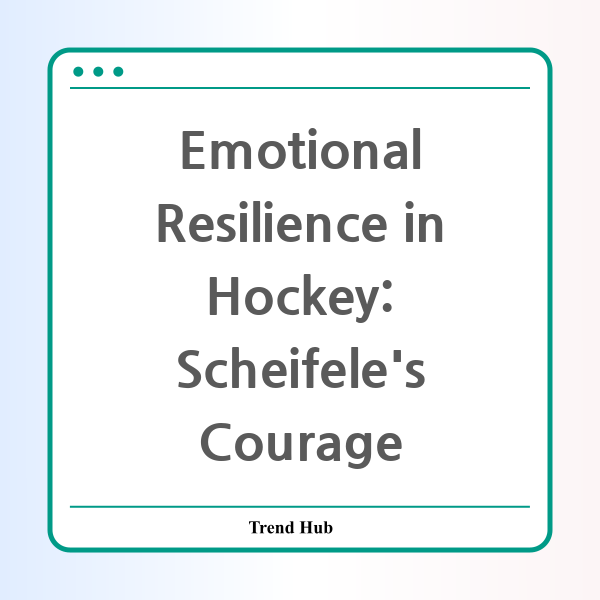* This website participates in the Amazon Affiliate Program and earns from qualifying purchases.

Emotional resilience is a vital trait in sports, and few moments encapsulate this better than the recent playoff game where Mark Scheifele took to the ice just hours after the unexpected loss of his father. How does one balance personal grief with the pressures of elite competition? Scheifele’s story not only highlights his strength but also offers us a glimpse into the camaraderie and support that exists within the hockey community.
On a night filled with high stakes, Scheifele scored a crucial goal early in the second period, giving his team, the Winnipeg Jets, a brief 1-0 lead against the Dallas Stars. This remarkable moment unfolded shortly after the heartbreaking news of his father’s passing, confirming that even in the toughest times, finding a purpose can yield incredible strength.
As the game progressed, emotions ran high. Stars defenseman Thomas Harley scored the overtime goal that ultimately eliminated the Jets from the playoffs, but not without a significant backdrop of personal tribulation for Scheifele. After he committed a penalty late in regulation, he served time in the penalty box, witnessing his team's fate shift dramatically. This moment was not just about the game; it was a profound testament to the emotional battles faced by athletes.
The post-game handshake line, a long-standing tradition in hockey, highlighted the respect and support among players, transcending on-ice rivalry. Scheifele shared heartfelt embraces with opponents, including Mason Marchment, who, having lost his father a few years prior, offered him some poignant words of comfort amidst their shared sorrow. Marchment’s gesture illustrated the profound connections forged in the world of sports, where players become an extended family.
According to Jets coach Scott Arniel, the team rallied around Scheifele, recognizing the heavy burden he carried that night. He stated, "Mark will be playing tonight... that'd be the wishes of his dad. He would have wanted him to play." This sentiment underpins the idea that family—both biological and chosen—plays a critical role in an athlete’s life, particularly during periods of crisis.
Despite the outcome of the game, Scheifele’s performance stood as a testament to his character and determination. Finishing the playoffs with an impressive 11 points, including five goals and six assists in just 11 games, he demonstrated a professional commitment that resonates with fans and aspiring athletes alike. His ability to compartmentalize pain and perform at such a high level speaks volumes about his mental fortitude.
As we reflect on Scheifele's journey and the events of that unforgettable night, it serves as a reminder of the human element in professional sports. Athletes are not merely entertainers; they confront challenges that often stretch beyond the game. The hockey world’s collective support amid personal loss illustrates a beautiful side of sports—a community where emotional well-being is cherished as much as victories on the ice.
Ultimately, the experience highlights the importance of mental health and emotional support for athletes. Just as Scheifele found strength in his teammates, fans and fellow players can play a crucial role in fostering an environment of compassion and understanding, turning the competitive arena into a supportive haven during life's toughest moments.
* This website participates in the Amazon Affiliate Program and earns from qualifying purchases.